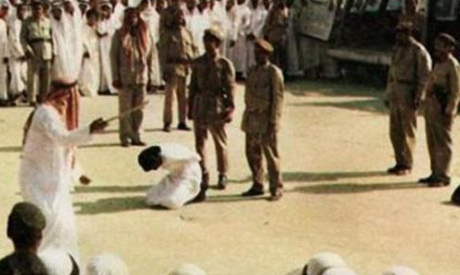Beheadings in Saudi Arabia hampered by a shortage of official swordsmen (Ahram Online)

Swordsman prepares to behead convict in Saudi Arabia (Photo: Al-Ahram)
Many societies nowadays face (actual or potential) shortages of essential skills. Here in the US, for example, there seems to be a shortage of trained engineers. According to this report from Ahram Online (Egypt), Saudi Arabia faces a looming shortage of trained swordsmen for beheading convicted criminals (murderers, rapists, armed robbers, drug dealers, apostates, etc.). They may be forced to use firing squads instead–which would mean the loss of a cherished tradition, thus contributing to the erosion of cultural diversity and the increasing tendency toward bland uniformity in the contemporary world.
A joint Saudi committee composed of representatives of the ministries of interior, justice and health is mulling the replacement of beheading with firing squads for capital sentences due to shortages in government swordsmen, Saudi daily Al-Youm reported on Sunday.A number of other prisoners–some estimates run in the hundreds–are executed every year with less publicity and less picturesque procedures.
The committee argued that such a step, if adopted, would not violate Islamic law, allowing heads – or emirs – of the country's 13 local administrative regions to begin using the new method when needed.
"This solution seems practical, especially in light of shortages in official swordsmen or their belated arrival to execution yards in some incidents; the aim is to avoid interruption of the regularly-taken security arrangements," the committee said in a statement.
The ultra-conservative Gulf kingdom beheaded 76 people in 2012, according to an AFP tally based on official figures. Human Rights Watch (HRW) put the number at 69.
Rape, murder, apostasy, armed robbery and drug trafficking are all punishable by death under Saudi Arabia's strict version of Sharia, or Islamic Law. So far this year, three people have been executedThis tension is due to the fact that many foreigners show insufficient respect for Saudi traditions. Nor is this cultural intolerance and insensitivity restricted to western "human rights" obsessives. Countries with migrant workers in Saudi Arabia sometimes complain when one of them gets executed (or raped, beaten, tortured, and/or swindled by their employers). And one Saudi expatriate recently described the Saudi system as "one of the most backward and xenophobic judicial systems on the planet." The Saudi government is understandably offended by unreasonable criticisms of this sort.
The beheading issue has always been a source of tension between Saudi Arabia and the international community.
Last month, Saudi Arabia slammed international reactions to its beheading of a Sri Lankan woman convicted of killing her employer's baby.(Thanks to Mick Hartley for the tip.)
Riyadh "deplores the statements made ... about the execution of a Sri Lankan maid who had plotted and killed an infant by suffocating him to death one week after she arrived in the kingdom," a government spokesman said. [JW: The maid claimed that the baby's death was accidental. But she would, wouldn't she?]
The case sparked widespread international condemnation, including from rights groups that said she had only been 17 years old when she was charged with murdering the baby in 2005.
The case soured the kingdom's diplomatic relations with Sri Lanka, which on Thursday recalled its ambassador to Saudi Arabia in protest.
The UN's main human rights body on Friday expressed "deep dismay" at the beheading, while the European Union said it had asked Saudi authorities to commute the death penalty. Riyadh, however, rejected the statements as "external interference" in its domestic affairs.
Saudi Arabia "respects... all rules and laws and protects the rights of its people and residents, and completely rejects any intervention in its affairs and judicial verdicts, whatever the excuse," the spokesman said.
–Jeff Weintraub


<< Home